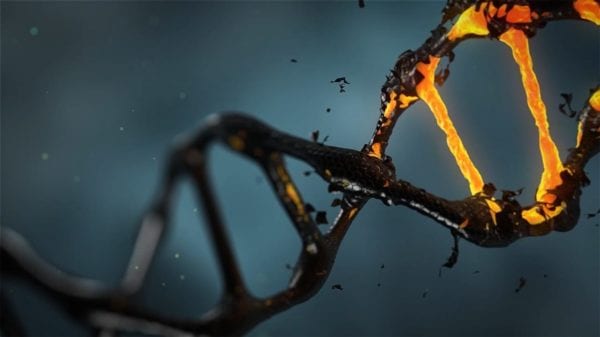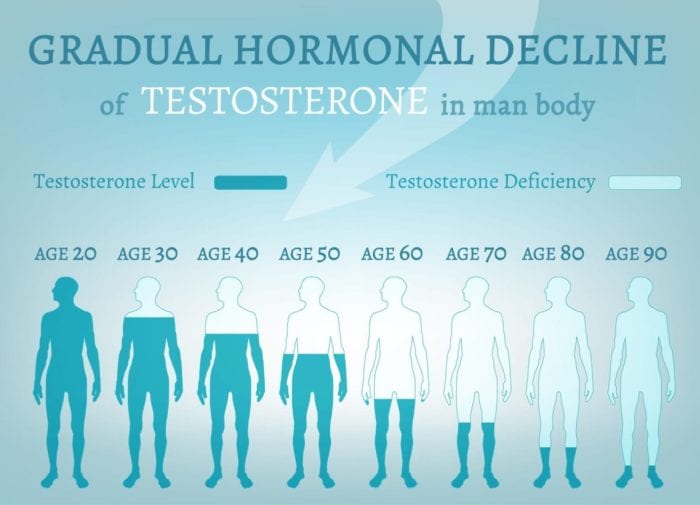When Does Andropause Start?
Low-T, also referred to as low testosterone or andropause, begins occurring in men as early as age 30, though symptoms are usually first noticed closer to age 40. Testosterone levels gradually decline at a rate of about 1-2% per year starting in your late 20’s and continues throughout your life.
Because this happens so slowly, men often do not notice the symptoms associated with hormonal imbalance and do not realize how low their testosterone actually is until years later. Most men in their late 30s and older are operating at about 50% of their optimal range. We usually treat males who are over 35 years of age but there are some exceptions.

Signs and Symptoms of Hormonal Imbalance in Men
The earliest Symptoms of Testosterone Deficiency involve physical, mental, sexual and general health.
PHYSICAL
Fatigue and decrease in energy levels, physical weakness & decrease in muscle mass, decreased body hair, increase in body fat (especially stomach fat), Sleep Issues, Weak and Fragile Bones, backache, joint pain & stiffness, decreased effectiveness of workouts, Rapid weight loss, Breast enlargement, Water retention, Adult acne, Headaches/Migraines
MENTAL
The onset of depression, unexplained anxiety or panic attacks, muddled thinking, and a loss of self-confidence and self-esteem are common early symptoms of the progressive loss of testosterone. Other mental symptoms include being less effective at work, grumpiness, irritability, decreased sense of well-being, loss of drive & competitive edge and lack of concentration. The quality of life deteriorates, even to the point that studies have shown that TD depression can be so severe that it can lead to suicide.
SEXUAL
Testosterone is the primary source of sexuality for both men and women, stimulating their desire for sex (libido). The continuing loss of the hormone leads to a progressive disinterest in sexual activity. Men usually start to experience erectile dysfunction or impotence and eventually all interest in sex gradually disappears. They may also notice a decrease in semen production, loss of morning erections and decrease in orgasm intensity.
GENERAL
Increased Cholesterol Levels, Anemia (Low Iron Levels), decreased immunity, Relationship problems with your partner, Prostate inflammation, Low thyroid symptoms, Hypoglycemia, Diabetes, Insomnia

Treatment with Testosterone

By undergoing hormone replacement therapy, or HRT, you can increase your testosterone levels and correct the other aspects of your health as you reach an age of maturity. This will reduce your risk of Alzheimer’s, osteoporosis and prostate cancer while simultaneously giving you a renewed vigor in life. Within a matter of weeks from the start of therapy, men experience heightened sexual activity, greater and faster brain responsiveness, reduced fat, a healthier heart and an overall renewed body.
We offer the following procedures and treatments:
Topical Testosterone Creams
The use of creams and gels are very common, requiring daily application once or twice a day. We can also have testosterone cream compounded to a specific dose for a particular patient. The upside to using a topical cream is that there is no injection. However, there are a few important concerns when it comes to using topical hormone creams.
Topical testosterone cream sounds quick and easy, but there are some important concerns which we have to take into account prior to prescribing. Topical testosterone cream can be transferred through the clothes for up to 12 hours after application. What does this means for patients? We do not recommend topical to men with small children because they can transfer it to the kids. Once it is transferred to the kids they will start developing masculinization symptoms.
Not only does testosterone transfer occur up to 12 hours after application, if you are not careful with your hygiene after application will also inadvertently transfer it to others as well. For instance, let’s say you apply your cream a with your right hand and then you use that hand to open the faucet, you will leave some residual testosterone cream on the tap and some who comes along and opens that faucet later will inadvertently absorb the hormone.
Men who are married or involved in a relationship should really consider not using topical testosterone because it can be transferred during intimacy.
On another note, testosterone applied on the skin is quickly converted to DHT because most of the enzymes which convert testosterone to DHT is located in the skin. While on testosterone replacement therapy the DHT levels will monitored on a regular basis.
Testosterone Injections
Interestingly, many men who seek hormone replacement therapy prefer injectable therapy. For those who are interested in doing self-injections, our office will schedule a training session in order to teach you how to perform self-injections safely. This session takes about 10-15 minutes. Treatment by injection is often a better option; a shot of testosterone is usually performed 1-2 times a week based on the dose. The down side is the hassle of self-injection and the pain associated with the shot. In addition to the pain associated with the injection there may be some pain from the actual testosterone which is rare.
Injectable testosterone is in an oil base and can produce some muscle soreness after injections. The oil base allows for the hormone to be time released for 7-10 days. With hormone injections, the injection sites can be rotated between injections. There is also the potential to develop a skin infection at the injections site-which is why we do an injection training session. This is extremely rare if you follow the injection technique as taught.
Many men prefer this option and it is the most popular option. This is a good option for men who are married or are involved in a relationship, men with small kids and single guys.
Low T in Men can Result in:
- Fatigue, tiredness or loss of energy
- Depression, low or negative mood
- Irritability, anger or bad temper
- Anxiety or nervousness
- Loss of memory or concentration
- Relationship problem with partner
- Loss of sex drive or libido
- Erection problems during sex
- Loss of morning erections
- Decreased intensity of orgasms
- Backache, joint pain or stiffness
- Loss of fitness
- Feeling over-stressed
- Loss of drive and competitive edge
- Stiffness and pain in muscles and joints
- Falling level of fitness
- Decreased effectiveness of workouts
Testosterone Optimization or Replacement Can Result in:
- Decreased aging of heart and better circulation
- Protection against heart disease
- Lower cholesterol levels
- Decreased risk of heart attacks and strokes
- Decreased risk of diabetes
- Decreased body fat
- Increased lean muscle
- Increased blood flow to brain
- Decreased brain aging
- Improved memory, mental functioning and ability
- Improved concentration and focus
- Decreased risk of dementia and Alzheimer’s
- Increased sense of well being and mood
- Increased energy, stamina and endurance
- Increased sexual potency and frequency
- Decreased osteoporosis (bone loss)
- Decreased risk of prostate cancer
